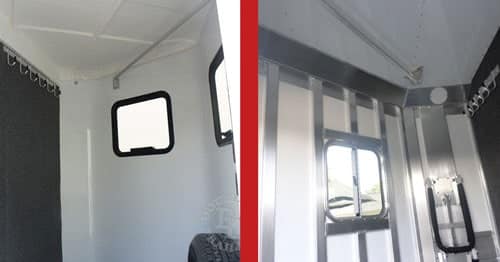Are Your Horse Trailer’s Walls Strong Enough?
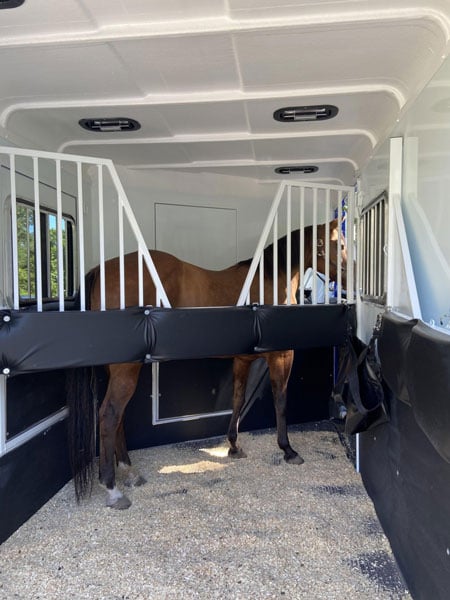
The walls of your horse trailer matter just as much. After all, they make up a huge part of the horse trailer’s structure. In this article, we’re going to discuss the various options you may see in horse trailer wall construction. Some of these options are definitely safer than others…
Bad Option #1: Single Layer Aluminum
People seem to be fascinated by aluminum horse trailers. They like how these trailers are resistant to rust and lightweight for hauling. But the love-story stops there…
Trailers with only a single layer of aluminum sheet metal covering the horse trailer’s frame are bad news for your horses. Remember, aluminum is an excellent conductor of heat. This means that any sun that shines on the outside of your trailer quickly radiates inwards to your horses.
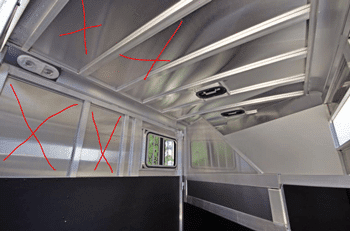
The other really big problem with single-layer aluminum walls has to do with strength. Or, should we say lack of strength. A single layer of 0.040 aluminum sheet metal is not going to protect your horses in the case of an accident.
Also, trailers with this type of wall construction are not going to protect your horse from himself. A lot of horses love to kick out after they load into a trailer. This might be out of fear, aggression towards another horse, or just because they are just plain annoyed to be on the trailer in the first place.
Each of those kicks packs a powerful blow which goes directly onto the walls of your trailer. If the construction of those walls is weak, the trailer is going to be damaged. Worst case, your horse could even poke a hole through the metal in one of these trailers and seriously injure himself.
Bad Option #2: Double Layer Aluminum
This section option is slightly better but still not ideal. An insulated horse trailer with two layers of 0.040 aluminum on the walls will provide better protection against the heat.
You’ll know if your horse trailer is insulated simply by looking at the interior walls. If you can see the vertical support beams of your horse trailer’s frame, then the trailer is not insulated. If you see only a smooth surface on your trailer’s interior walls, then it’s insulated. (see photo below)
Just be careful to check the entire trailer. Many times, companies will insulated the horse area, but then slack off when it comes to the human areas in the front. This means the front dressing rooms in bumper pull horse trailers, or the sleeping area in gooseneck horse trailers is left uninsulated… a.k.a. hot, sweaty and uncomfortable for anyone who spends time in there.
Just like with the single layer option above, a trailer with a double layer of aluminum is still going to be vulnerable to damage. This type of wall still will not protect your horse well in case of a roadway accident or a horse kicking from the inside.
Great Option #3: Insulated Walls with Galvalite
If you’ve ever traveled to the beach, you’ve likely seen big, beautiful beach houses lining the sandy shores. These houses have strong metal roofs that can withstand huge storms, winds, and the constant barrage of salt water. The metal in these roofs is actually coated with zinc to be extra strong and durable.
T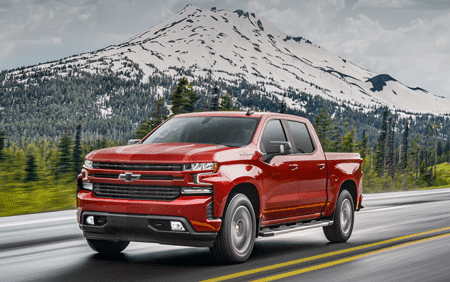
If you take that same technology and apply it to a horse trailer, you have the best option for horse trailer wall construction. The only difference is that we purchase it in a smooth sheet rather than the ridges in a typical truck bed or beach house roof.
We call it Galvalite…
Galvalite looks almost identical to sheet aluminum to the naked eye. However, the real difference is in the strength. Our 16-guage Galvalite will actually be 5 TIMES stronger than 0.040 aluminum. Just like aluminum, Galvalite is going to look great and won’t rust.
This means fewer problems down the road with your trailer, less warpage on the side wall sheets, and – best of all – better protection for your horse in the case of an accident.
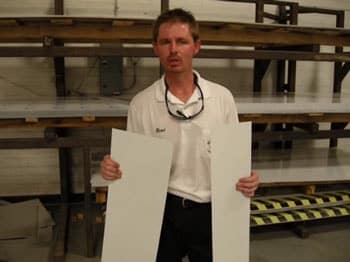
On Double D Trailers, we use 0.040 aluminum on the exterior skin of the trailer. Then, we use 16-guage Galvalite on the interior skin where strength makes the biggest difference. This double layer of metal creates an insulated trailer wall system that checks all the boxes.
- Horses are protected from extreme temperatures.
- Roadway noises is dampened down to keep your horse calmer.
- Walls have more strength in case of a vehicular accident.
- Interior walls are more resistant to horse kicking or panicked rearing.
- The trailer is going to have fantastic strength and durability for years to come!
Brad Heath, owner of Double D Trailers, has this to say about Galvalite: “It doesn’t rust and is much stronger than aluminum. This strength means that in a high stress situation, the Galvalite will definitely take the abuse much better.”
And Those Other Parts of the Trailer’s Walls?
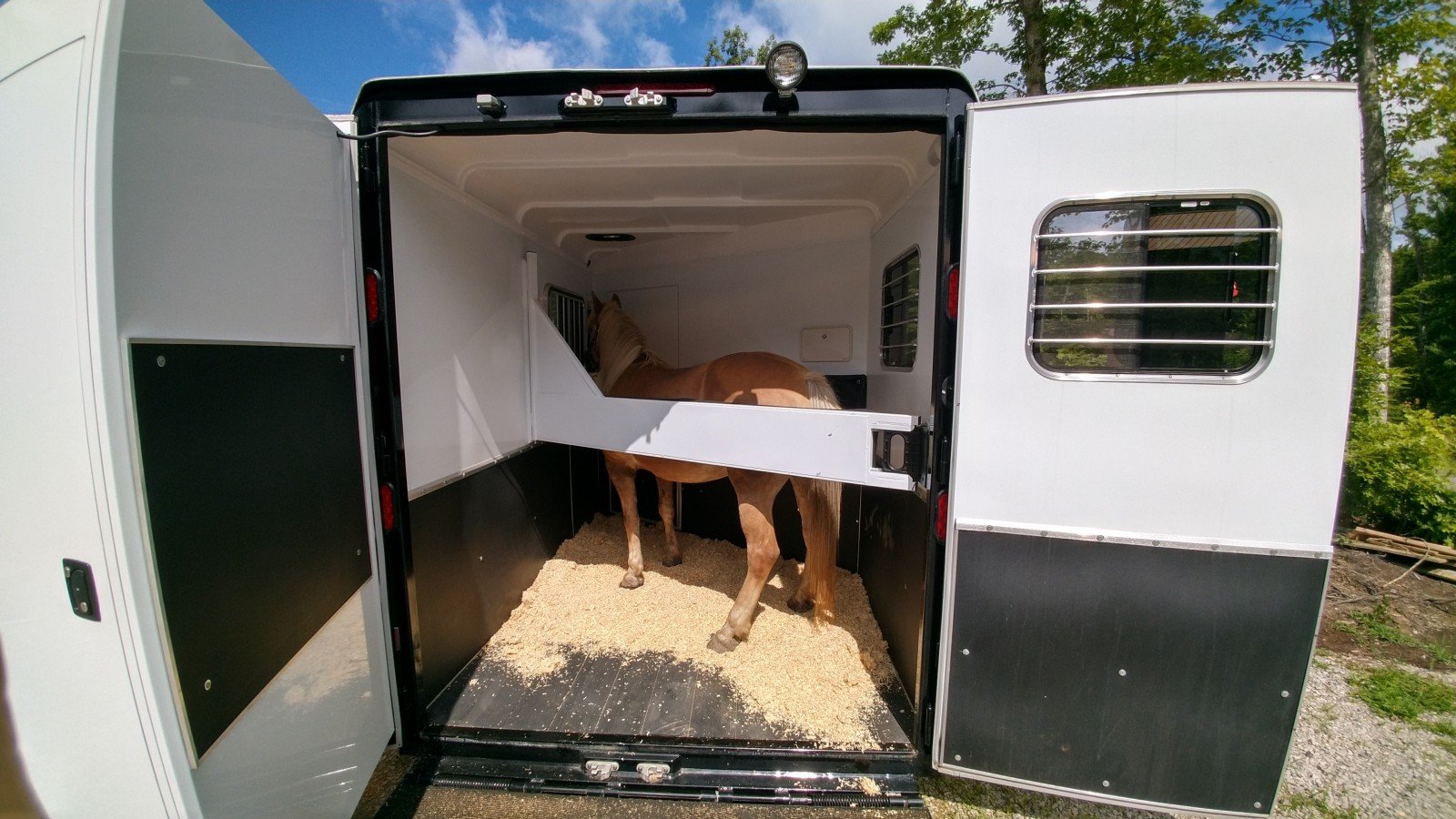
You can read more about the safety properties of Z-Frame trailer frames here.
Then, we use a SafeKick wall system on the lower portion of the trailer’s interior. Many other trailer simply hang rubber pads held up by metal fasteners. When a horse kicks or paws, the rubber is scrapped away exposing those sharp screws. This creates a safety hazard for your horse.
We use SafeKick panels that are designed to flex when impacted. There is actually a layer of high density Styrofoam insulation directly behind the panel to help cushion your horse’s legs and prevent injury.
Learn more about our SafeKick system here.
If you have any questions about the safety and integrity of your horse trailer walls, contact Brad here. He’s happy to answer your questions and help you choose the right building materials for your own custom horse trailer.

